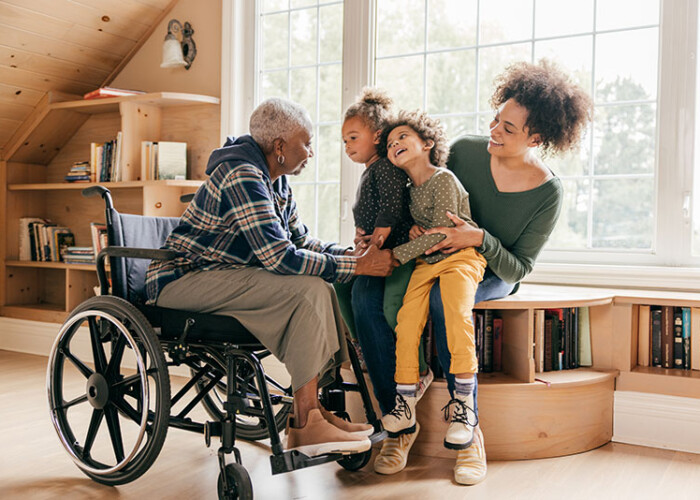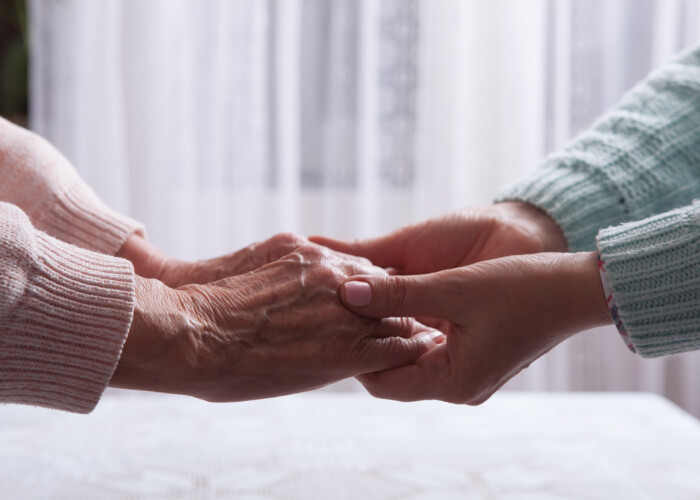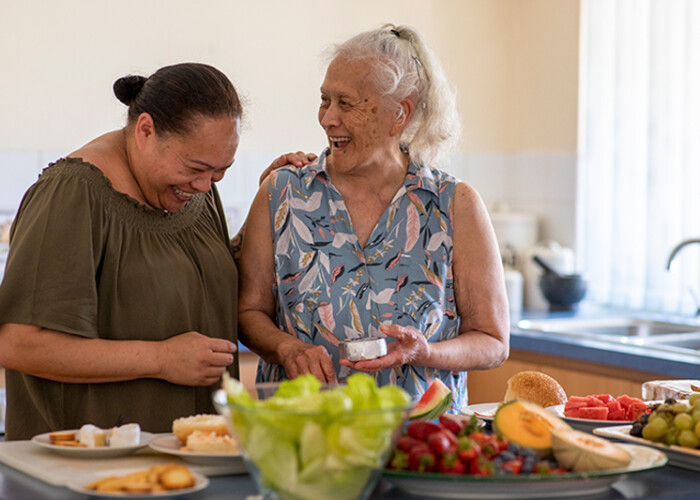Senior Independence
The Emotional Journey of End-of-Life Eating Changes
When a loved one is approaching the end of life, every moment becomes even more meaningful, but it can also be a time of great emotional difficulty. One of the changes you may notice is their decreasing interest in food and drink, which can be especially distressing. Watching someone you care about stop eating can leave you feeling worried, helpless, and unsure of how to help. However, understanding why these end-of-life eating changes happen and focusing on providing comfort rather than nourishment can ease this challenging time for both you and the person you love. The goal shifts from ensuring they eat to making sure they are comfortable and at peace.
Why Eating Changes Occur at the End of Life
As a person’s body prepares for the end of life, their need for food and drink diminishes. Metabolism slows, … Read More »
What You Need to Know About End-of-Life Dementia Care
Caring for a loved one as they near the end of life is an incredibly personal journey. When Alzheimer’s disease is part of this experience, the path can become even more intricate. Unlike many other terminal illnesses, dementia progresses in unpredictable ways, requiring us to adjust our approach to end-of-life dementia care.
Identifying End-of-Life Signs in Dementia
In many diseases, the end-of-life stage is marked by noticeable changes in areas such as eating, sleeping, and socializing, often appearing two to four months before death. However, with Alzheimer’s disease, these indicators can emerge much earlier, sometimes even years in advance. These are the key signs to watch for:
Extended Sleep Patterns: Long periods of sleep can occur well before the final stages of life in someone with dementia. While this may be an early sign, it can also continue over a … Read More »
The Importance of a Daily Routine for Someone With Dementia
Have you ever woken up from a dream feeling completely disoriented? The dream seemed so real, and it takes a moment to regain your bearings. For someone with dementia, this disorientation is a part of everyday life. One highly effective way to help is to provide as much stability as possible, and one of the best ways to accomplish this is by sticking to a daily routine for someone with dementia.
How Can a Routine Help Someone With Dementia?
Short-term memory loss makes it challenging for someone with Alzheimer’s to learn and remember new things. A familiar routine helps build self-confidence, reinforce a sense of independence, and reduce anxiety.
To establish the most comfortable routine for a loved one with Alzheimer’s disease, try the following:
Follow their lead. Retain any routines the person already has built: a morning shower before … Read More »
Hidden Disabilities in Seniors: How to Recognize and Combat Ableism
What’s your first thought when you see an individual in a wheelchair? Do you view that person as less-than, someone in need of being fixed? Do you assume they need special treatment, as though a physical disability impacts intellect as well? How does your thinking shift to see someone standing upright, without the need for a wheelchair; would you think they were better-abled than the wheelchair-bound older adult?
These are tough questions that call for honest answers if we’re to understand and respond accordingly to hidden disabilities in seniors and ableism.
What Is Ableism?
Ableism is identified as “the discrimination of and social prejudice against people with disabilities based on the belief that typical abilities are superior.” It leads to harmful misconceptions and stereotypes.
The Two Sides of the Disability Coin
Individuals with visible disabilities encounter ableism in many … Read More »
Supporting Mental Health in Aging Parents and Breaking the Stigma
Supporting mental health in aging parents starts with recognizing the signs and addressing the stigma around mental health care.
Mental health is a critical aspect of well-being throughout life, and it becomes even more significant as our parents grow older. For many older adults, however, talking about mental health can be especially difficult due to ingrained stigmas and the values they were raised with. It’s important to understand why older loved ones might be hesitant to discuss mental health and to recognize the signs that they might be struggling. This knowledge can guide you in supporting mental health in aging parents to ensure they receive the support and care they need.
Getting to the Root of Restlessness in Dementia
Uncover the reason behind restlessness in dementia in someone you love by answering these key questions.
Pacing. Fidgeting. Wandering. When you begin to notice these signs in someone you love with dementia, it’s time to take action before they escalate to agitation, aggression, or leaving the home. But figuring out why the person is feeling restless in dementia is sometimes half the battle.
Steps to Boost Socialization for Introverted Seniors
Try these creative ideas to improve socialization for introverted seniors.
Prepare yourself…the holidays will be here before we know it! Although there are plenty of people who flourish on the hectic pace of celebrations and parties, there are others who balk at the thought of going outside of their comfort zone and into more intensive social obligations. It may simply come down to one integral difference: introversion vs. extroversion. And it is important to know which distinction the seniors in your life lean towards more. Socialization for introverted seniors is just as important as for extroverted seniors, and finding the right type of socialization to help them feel most comfortable is key.
The Incredible Benefits of Hugs for Seniors
The benefits of hugs for seniors may surprise you!
Remember during the height of the pandemic, when social distancing was the norm and we needed to be satisfied with virtual visits? One of the most basic aspects of being a human – physical touch – was put aside in order to protect us all from harm.
Get Cooking With These Creative Dementia Care Activities
If there’s one thing that connects us all, it’s food! Think about how many cherished memories have been made through the years that included food at the center of them all: holiday meals, birthday parties, wedding celebrations. Even ordinary days include routines that become ingrained in us around food, from that first aromatic cup of coffee in the morning to a shared bowl of buttery popcorn with family while watching a show on television.
It really is no surprise that food is not just a necessity for our physical health, but often a powerful way to connect with someone with dementia. Here are several creative dementia care activities you can try to help spark memories while engaging all the senses through food.
Storytelling. Pull out an old cookbook and look through the recipes together to determine if any spark memories. … Read More »
What to Do When a Parent Refuses Care
When a parent refuses care, these tips can help you come to a resolution.
Let’s say you’re starting to notice some warning signs that cause you to worry about Dad’s ability to continue to take care of himself. Perhaps he’s struggling to maintain the home the way he always has. Or maybe he had a close call while driving that could have caused injury to himself or another person. Maybe he just seems more disoriented lately. Whatever the reason, you’ve decided to talk with him about home care services. The problem is, he refuses to even entertain the idea. What are you to do when a parent refuses care that they desperately need?
If you’re at an impasse on how to proceed, these ideas can be helpful.
Let him know you’re in this together. Digging in your heels and … Read More »

















